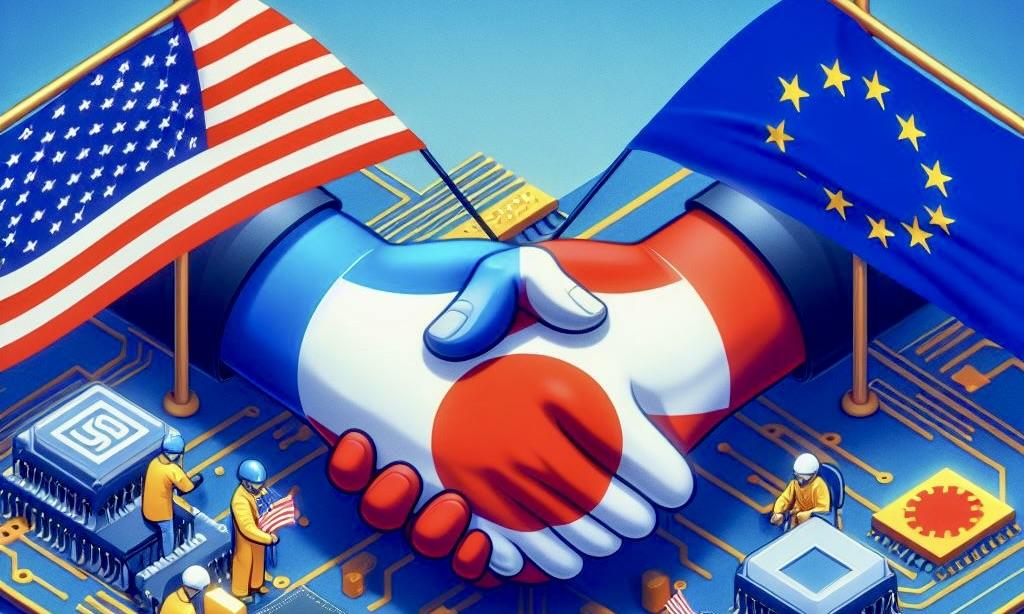Japan and the United States are poised to deepen ties in the high-tech sector, signaling a strategic move to enhance their global partnership with a focus on artificial intelligence and semiconductor cooperation.
Strengthening Bilateral High-Tech Ties
According to the Asahi Shimbun newspaper(via Reuters), during a forthcoming joint statement, Japan and the United States are set to expand their cooperation in cutting-edge fields, including artificial intelligence (AI). This declaration is anticipated when Prime Minister Fumio Kishida meets with President Joe Biden in the United States next month.
The engagement, marked by Kishida's official visit on April 10, is expected to underscore the "global partnership" between the two nations, emphasizing a concerted push towards collaborative advancements in AI and semiconductors, though specific sources were not cited.
Asahi Shimbun reports that this agreement may create a framework for AI research and development, engaging tech giants such as Nvidia, Arm, and Amazon. This initiative underscores a significant step in bilateral relations, aiming to leverage the strengths of both nations in the face of global technological challenges.
Expanding Collaborations Beyond Bilateral Borders
Parallel to the Japan-U.S. accord, Japan and the European Union (EU) are gearing up to initiate dialogue on cooperation in developing innovative materials for next-generation processors and batteries. This effort seeks to mitigate their reliance on China for critical resources. Iliana Ivanova, the EU Commissioner for Innovation and Research, expressed in a written interview with the Business Daily the mutual benefits such a collaboration could bring.
The proposed framework, responding to an EU request and set to launch as early as April, aims to reduce dependency on China for essential commodities like rare metals. US News states that these materials are integral to various applications, including electric vehicle batteries, highlighting a strategic move to diversify sources and enhance technological resilience.
These developments mark a significant shift in international technology partnerships, indicating a broader attempt to foster innovation, secure supply chains, and address global challenges collaboratively.
Photo: Microsoft Bing



 Antonio José Seguro Poised for Landslide Win in Portugal Presidential Runoff
Antonio José Seguro Poised for Landslide Win in Portugal Presidential Runoff  Netanyahu to Meet Trump in Washington as Iran Nuclear Talks Intensify
Netanyahu to Meet Trump in Washington as Iran Nuclear Talks Intensify  Trump Signs “America First Arms Transfer Strategy” to Prioritize U.S. Weapons Sales
Trump Signs “America First Arms Transfer Strategy” to Prioritize U.S. Weapons Sales  SpaceX Seeks FCC Approval for Massive Solar-Powered Satellite Network to Support AI Data Centers
SpaceX Seeks FCC Approval for Massive Solar-Powered Satellite Network to Support AI Data Centers  Nintendo Shares Slide After Earnings Miss Raises Switch 2 Margin Concerns
Nintendo Shares Slide After Earnings Miss Raises Switch 2 Margin Concerns  Nvidia CEO Jensen Huang Says AI Investment Boom Is Just Beginning as NVDA Shares Surge
Nvidia CEO Jensen Huang Says AI Investment Boom Is Just Beginning as NVDA Shares Surge  Nvidia, ByteDance, and the U.S.-China AI Chip Standoff Over H200 Exports
Nvidia, ByteDance, and the U.S.-China AI Chip Standoff Over H200 Exports  Anthropic Eyes $350 Billion Valuation as AI Funding and Share Sale Accelerate
Anthropic Eyes $350 Billion Valuation as AI Funding and Share Sale Accelerate  Global PC Makers Eye Chinese Memory Chip Suppliers Amid Ongoing Supply Crunch
Global PC Makers Eye Chinese Memory Chip Suppliers Amid Ongoing Supply Crunch  U.S. to Begin Paying UN Dues as Financial Crisis Spurs Push for Reforms
U.S. to Begin Paying UN Dues as Financial Crisis Spurs Push for Reforms  Amazon Stock Rebounds After Earnings as $200B Capex Plan Sparks AI Spending Debate
Amazon Stock Rebounds After Earnings as $200B Capex Plan Sparks AI Spending Debate  Google Cloud and Liberty Global Forge Strategic AI Partnership to Transform European Telecom Services
Google Cloud and Liberty Global Forge Strategic AI Partnership to Transform European Telecom Services  Nicaragua Ends Visa-Free Entry for Cubans, Disrupting Key Migration Route to the U.S.
Nicaragua Ends Visa-Free Entry for Cubans, Disrupting Key Migration Route to the U.S.  TrumpRx Website Launches to Offer Discounted Prescription Drugs for Cash-Paying Americans
TrumpRx Website Launches to Offer Discounted Prescription Drugs for Cash-Paying Americans  Norway Opens Corruption Probe Into Former PM and Nobel Committee Chair Thorbjoern Jagland Over Epstein Links
Norway Opens Corruption Probe Into Former PM and Nobel Committee Chair Thorbjoern Jagland Over Epstein Links  SpaceX Updates Starlink Privacy Policy to Allow AI Training as xAI Merger Talks and IPO Loom
SpaceX Updates Starlink Privacy Policy to Allow AI Training as xAI Merger Talks and IPO Loom  Elon Musk’s SpaceX Acquires xAI in Historic Deal Uniting Space and Artificial Intelligence
Elon Musk’s SpaceX Acquires xAI in Historic Deal Uniting Space and Artificial Intelligence 






























